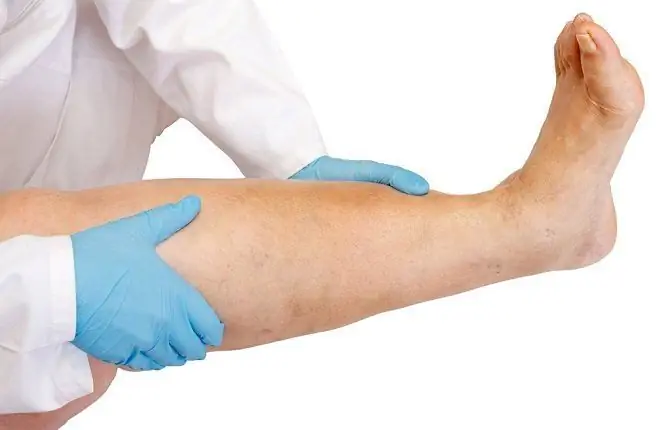- Author Rachel Wainwright wainwright@abchealthonline.com.
- Public 2023-12-15 07:39.
- Last modified 2025-11-02 20:14.
Diuretic herbs for edema
The content of the article:
- The effect of diuretic herbs on the body
-
List of plants and recipes
- Horsetail
- Parsley
- Lingonberry
- Bearberry
- Celery
- Birch tree
- cornflower
- Rosehip
- Precautions
- Indications for the use of folk remedies
- Video
Diuretic herbs for edema are mild and rarely cause side effects. In contrast to medications, medicinal herbs can be taken during breastfeeding, with concomitant diseases - diabetes mellitus, gout. Swelling on the legs and face can be a symptom of impaired functioning of the kidneys, heart, liver. For treatment, diuretics and herbal diuretics are used.
The effect of diuretic herbs on the body
Diuretic herbs can reduce swelling by increasing the excretion of fluid in the urine. The diuretic effect is explained by the presence of substances that increase the renal blood flow, and irritate the renal tissue. For example, arbutin in bearberry leaves, essential oils in juniper fruits and birch buds.
List of plants and recipes
The most popular diuretic herbs include: horsetail, parsley, lingonberry, bearberry, celery, birch, cornflower, rosehip. From plants, you can prepare teas, decoctions, infusions and tinctures for internal use. It is necessary to observe a certain ratio of medicinal plant and water in order to obtain the desired concentration of the drug.
Horsetail
Horsetail provides a mild diuretic effect by stimulating the elimination of excess fluid. Horsetail can cause irritation of the kidney tissue, so its use is contraindicated in nephritis and nephrosis.
To prepare the infusion, you need to take horsetail herb. What you need to prepare the medicine:
- 2 tablespoons of chopped horsetail herb
- 400 ml boiling water.
The herb is poured with water and insisted for 15 minutes, after cooling it is necessary to strain the infusion.
Shake the infusion before taking it. Take a drink of 50 ml 4 times a day 1 hour after meals. For children, the dosage is less - 2 tablespoons.

Horsetail
Parsley
One of the main properties of parsley is its diuretic effect. The plant is used for indoor and outdoor use.
Inside, a decoction and infusion are used. Lotions can help with swelling around the eyes. How to prepare and take the medicine:
| Parsley root decoction |
You will need 2 teaspoons of chopped parsley roots and 1 cup of boiling water. The roots must be poured with water and boiled in a water bath for 15 minutes. You need to drink a decoction of 100 ml 2 times a day 30 minutes before meals. |
| Infusion of parsley seeds |
To prepare the infusion, you will need 1 teaspoon of parsley seeds and 1 liter of water. Seeds are poured with cold water, insisted for 12 hours. Strain the infusion before use. An infusion is taken in 2 tablespoons 3 times a day 30 minutes before meals. |
| Lotions | For lotions, you can use both infusion and decoction. Cotton pads or gauze napkins must be moistened in the finished broth (infusion). Lotions are applied to the eye area, hold for 15 minutes. |

Parsley
Lingonberry
For medicinal purposes, you can use the fruits and leaves of the plant. Lingonberry is a mild diuretic, and also has a choleretic, antispasmodic and restorative effect. The following medicines can be prepared from lingonberries:
| Lingonberry leaf decoction |
For cooking, you will need 2 tablespoons of dry lingonberry leaves and 1 glass of hot water. Lingonberry leaves need to be poured with water and cooked in a water bath for 30 minutes. After that, the broth must be filtered, cooled and added 200 ml of boiled water. The ready-made broth is taken in 50-100 ml 3 times a day before meals. |
| Lingonberry tea |
To make tea, you need 1 teaspoon of crushed leaves and 1 cup of boiling water. The leaves are poured with water and left for half an hour. You need to take tea before meals, 100 ml. You can drink up to 0.5 liters of this drink per day. |
| Lingonberry infusion |
For cooking, you need 200 g of lingonberries and 400 ml of hot water. The fruits need to be washed, rinsed with boiling water and poured over with hot water. The drink is infused for 6 hours. You need to take the infusion 200 ml 2 times a day. |

Lingonberry
Bearberry
Bearberry has a relatively strong diuretic effect. Bearberry is used for inflammatory kidney disease, which is manifested by swelling of the legs and face. For the preparation of the medicine, bearberry leaves are used. Decoction recipe:
Pour 1 teaspoon of bearberry with 100 ml of hot water, cook in a water bath for 30 minutes, strain, dilute the broth with 100 ml of boiled water.
Warm broth should be taken 1 tablespoon 6 times a day 40 minutes after a meal.
When taking bearberry, some side effects can be observed: a change in the color of urine to dark green, diarrhea, allergic reactions. With the development of adverse reactions, you need to stop taking and consult a doctor.

Bearberry
Celery
Celery is useful for edema associated with kidney pathology. Freshly squeezed celery juice, root or seed infusion will help reduce swelling.
- Celery juice. The juice should be drunk 1 tablespoon 3 times a day 30 minutes before meals.
- Celery root infusion: pour 2 tablespoons of chopped roots into 1 liter of cold water, leave for 8 hours, strain. The finished infusion is taken 2 tablespoons 3 times a day before meals.
- Celery seed infusion: pour 1 tablespoon of plant seeds with 2 cups of cold water, leave for 4 hours, strain through cheesecloth. Infusion of seeds is taken 1 tablespoon 3 times daily before meals.

Celery
Birch tree
Birch buds are an effective diuretic. The drug based on birch buds not only removes excess water, but also has an antispasmodic, choleretic and anti-inflammatory effect. How to prepare the infusion:
Pour 10 g of birch buds with 400 ml of hot water, cook for 15 minutes in a water bath; strain.
The infusion is taken in 50-100 ml 3 times a day 20 minutes before meals. It is recommended to shake the infusion before taking it.

Birch buds
cornflower
Blue cornflower tea has a mild diuretic effect. The plant is contraindicated for use during pregnancy. Tea recipe:
1 teaspoon of blue cornflower flowers pour 0.5 liters of boiling water, let it brew for 5-15 minutes, strain the resulting tea.
It is better to drink tea 30-60 minutes before meals. You can drink up to 0.5 liters of this drink per day.

cornflower
Rosehip
Rosehip decoction is an effective diuretic. Rosehip has a mild effect, removes excess fluid from the body, replenishes vitamin deficiencies. How to make a rosehip drink:
Place 2 tablespoons of chopped fruits in a thermos, add 1 glass of boiling water, leave for 8 hours.
After cooling, the broth is ready for use. 1 glass should be drunk in small portions throughout the day.

Rosehip
Precautions
Medicinal plants are milder and weaker than medications, but misuse can also lead to a number of problems. To protect yourself, you need to follow some recommendations:
- The shelf life of the finished infusion or broth is on average 2 days. You cannot store the finished product longer.
- Medicinal plants are strong allergens. Before taking a new plant, it is better to conduct an allergic test (apply a small amount of a decoction or infusion to the skin and see the reaction).
- Precisely measure the amount of medicinal herbs required for preparation in order to obtain the desired concentration.
- Refrain from taking tinctures and decoctions for acute diseases of the digestive tract - gastritis, duodenitis.
- Take herbal preparations with caution during pregnancy. Some plants are toxic to the fetus and increase the tone of the uterus. Before using any product, you should consult with your doctor supervising pregnancy.
- Medicinal plants have a good healing effect only when used correctly. Herbal preparations do not work quickly, so you need to take them regularly. On average, the duration of a therapeutic course is 10-14 days.
Indications for the use of folk remedies
Medicinal plants that are diuretic can help treat peripheral edema (feet, face, hands). Medicinal herbs will not help with severe kidney, liver, or heart problems.
Indications for the use of medicinal plants:
- inflammatory diseases of the excretory system;
- swelling of the legs caused by prolonged standing or sitting;
- pathology of the heart.
Most often, herbal preparations are used as an adjunct to the main treatment.
Video
We offer for viewing a video on the topic of the article.

Anna Kozlova Medical journalist About the author
Education: Rostov State Medical University, specialty "General Medicine".
Found a mistake in the text? Select it and press Ctrl + Enter.






